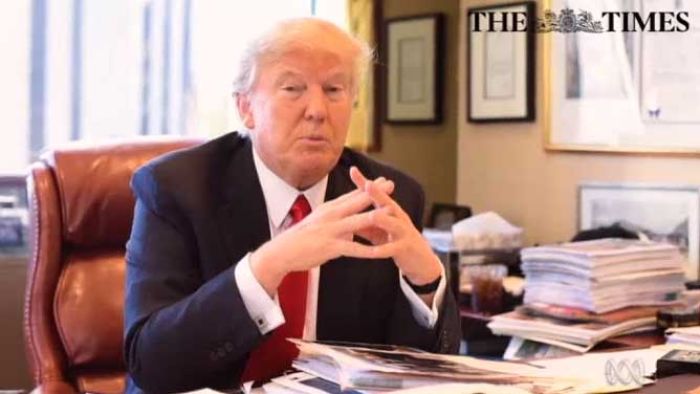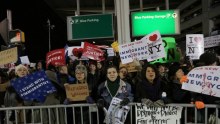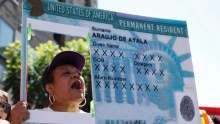Fear and loathing in Europe as leaders grapple with Trump's 'war'
Updated
Unfazed by the weight of history, Donald Trump says he will save America — from ISIS, drugs, the relentless march of technology and the demon ills of globalisation — without reaching out across the oceans to other Western democracies.
In his inauguration speech, putting "America first", he hardly mentioned the world beyond the US at all.
If Asia-focused Barack Obama was viewed with a sort of weary resignation in France and Germany, the criticism (in France over Syria, notably) never diminished respect for the former president's grace and articulacy, nor his commitment to basic public policies like providing Americans with affordable minimum health care.
Trump by contrast, especially in a recent interview with two European newspapers, has quickly caused shock and indignity over his apparent ignorance of a continent that took 50 painstaking post-war years to build.
As poet WH Auden once wrote:
"Among the Just / Be just, among the Filthy, filthy, too."
Well, some European leaders have now taken the gloves off where Trump is concerned.
"A declaration of war," said former French prime minister Manuel Valls.
"He proposed quite simply (in an interview with German tabloid Bild and The Times) the dislocation of Europe — on trade, immigration and the Transatlantic Alliance."
Outgoing French president François Hollande said: "(Europe) has no need for outside advice to tell it what it has to do."
On the French far-right, Marine Le Pen approved of both the interview and the speech.
German chancellor Angela Merkel, Europe's de facto leader, said:
"I believe firmly that it is best for all of us if we work together based on rules, common values and joint action in the international economic … and trade system and make our contributions to the military alliances."
One of her advisers was more blunt; he has "given up" hoping the new president will act in a statesman-like manner.
"None of us here believe that any more."
Indeed, it was to Germany and Merkel that Trump really took the bully stick in the newspaper interview, king-hitting four of modern Germany's sacred cows: security guaranteed by the NATO alliance; economic prosperity based on exports; values; and human rights, enacted by the chancellor's decision to accept more than a million refugees into Germany in 2015.
The personal slight came when Merkel was put on the same level as Russian president Vladimir Putin.
Asked who of the two he trusted more, Trump said: "I start off trusting both — but let's see how long that lasts. It may not last long at all."
Self-serving because Trump wants to build a wall along the Mexican border and Merkel opened her arms to refugees, the comment was nevertheless a sacred cow-puncher's thump for a loyal American ally, also close to the US for reasons of personal conviction and history.
Merkel's values are those of Europe as well of course, so the attack was as much anti-European as anti-German.
Another bit of brazen hyperbole, then, but there's a political message relating to Trump's vision of the world: political Europe, like other multilateral bodies, doesn't exist — not in the 1944 sense of a continent to be liberated from the horrors of Nazism.
For Trump, only nations matter and Britain has voted to do the right thing and leave the European Union. Only one other EU country counts in his view and that's Germany, to belittle if required.
Trump's tactic seems to be to seek to convince people not only of untrue things (his inauguration crowd size) but simple things.
That NATO might need further reforming is evident, or that Europe has its problems is simply said.
What Trump hasn't stated, or even hinted at, is the sort of Europe he would like to see, perhaps because he doesn't know or even care.
Yet that is the hard part of modern reform politics, especially in Europe: how to bring about change without wholesale dismantling (from the right) or silly, would-be revolution (from the left)?
Trump Tower must accord some magnificent views but Trump seems to see the planet in a brute state of nature, welling up unruly in primary colours from the street.
As the German deputy chancellor Sigmar Gabriel said after the inauguration, the next four years are going be a "rough ride".
Deeply worrying is that the journey will be across vastly unstable geopolitical terrain, where Commander-in-Chief Trump has nuclear codes and the ruthlessly opportunistic Putin, also sitting atop a massive nuclear stockpile, apparently surveys all that there is to be seen.
Let's engage and be active to ensure the aggressive, destructive tendencies of these two don't prove stronger than the more rational instincts of preservation.
Richard Ogier is an Australian journalist in Munich. He is a former Australian Embassy press attaché in Paris.
Topics: world-politics, us-elections, germany, france, united-states
First posted










